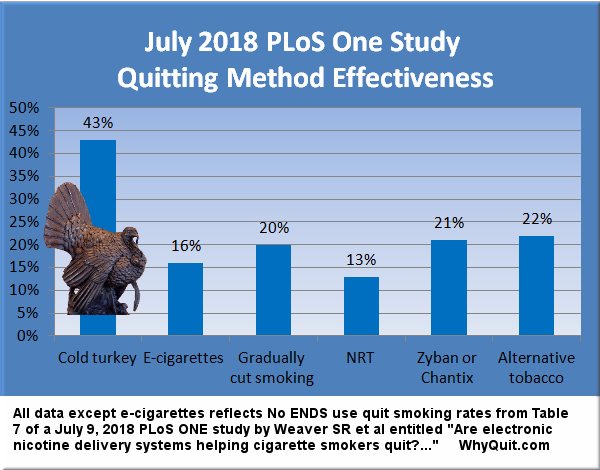Ten reasons to try smart turkey before e-cigarettes
Many are trying to convince you that it's simply too hard to quit smoking, that you are hopelessly hooked and should give up on "real" quitting. While obvious that there is no more deadly nicotine delivery device than cigarettes, it's also true that fully arresting your addiction is vastly more do-able and far more wonderful than your wanting for that next fix suggests.
Here are 10 reasons to devote time to learning how to stop smoking nicotine instead of how to start using e-cigs and adjust to vaping:
#1.  Cold turkey is highly productive - Cold turkey is generally defined as abruptly ending nicotine use without resort to quitting products or procedures. According to a July 2013 Gallup Poll, more smokers stop smoking cold turkey than by all other quitting methods combined. Truth is, the tail has been wagging the dog. Truth is, only a tiny fraction of successful ex-smokers quit smoking by using approved quitting products, a combined total of just 8 percent.
Cold turkey is highly productive - Cold turkey is generally defined as abruptly ending nicotine use without resort to quitting products or procedures. According to a July 2013 Gallup Poll, more smokers stop smoking cold turkey than by all other quitting methods combined. Truth is, the tail has been wagging the dog. Truth is, only a tiny fraction of successful ex-smokers quit smoking by using approved quitting products, a combined total of just 8 percent.
#2. Smart turkey is effective - Imagine becoming smarter than your addiction is strong. Imagine knowledge and understanding destroying quitting fears and the anxieties they breed. While placebo gets clobbered by replacement nicotine inside clinical trials, and replacement nicotine gets clobbered by cold turkey in real-world quitting (as do gradual weaning schemes), all experts consistently agree that understanding and skills development greatly enhance your odds of success.
#3. Most smokers have never tried smart turkey - Do you understand both why you smoke and how to stop? Use this 10 question quiz to measure your quitting I.Q.
- True or False: Recent findings suggest that nicotine addiction is a brain wanting disorder in which nicotine compromised dopamine pathways assign nicotine use the same priority as they assign to eating food. True
- True or False: Successful quitting has only one rule. It's called the Law of Addiction. True
- True or False: Nicotine is a stress-buster. False. Smokers smoke more when stressed or when drinking alcohol due to urine acidification accelerating elimination of the alkaloid nicotine from their bloodstream.
- True or False: Most quitting symptoms are blood sugar related and avoidable, including difficulty concentrating. True
- True or False: Blood caffeine levels double after ending nicotine use. True
- True or False: The fact that nicotine's blood serum elimination half-life is roughly 2 hours guarantees that the body will become 100% nicotine-free, that brain receptors will begin re-sensitizing, and that you will move beyond peak withdrawal within 72 hours of ending all nicotine use. True
- True or False: When quitting, cue triggered crave episodes normally begin to subside within 3 minutes but time distortion or panic can make them feel longer. True. Also, for the average quitter the number of episodes peak by day three.
- True or False: Crave episodes are good not bad as there is a prize at the end, extinguishing another conditioned use cue and return of a time, place, person, activity or emotion during which you'd trained your mind to expect a new supply of nicotine. True
- True or False: Recovery is a temporary journey of readjustment that leads to entire days where you never once think about wanting to smoke nicotine. True
- True or False: Over time, smart turkey quitters become calmer, more energetic and overall feel better than people who continue to feed their addiction nicotine. True
#4. Quality smart turkey recovery tools are free - WhyQuit.com receives 2.2 million annual visitors, is dedicated to smart turkey quitting, and its founder is the author of "Freedom from Nicotine - The Journey Home." More than 4 million downloads, Joel's Library is home to the popular cold turkey stop smoking ebook "Never Take Another Puff." YouTube is home to Joel Spitzer's Stop Smoking Video Library containing nearly 500 cold turkey quitting videos. Facebook's popular nicotine cessation support group is Turkeyville, which is exclusively for cold turkey quitters.
#5. Nicotine addiction is REAL drug addiction - When looking in the mirror do you see a real drug addict looking back? Knowing and accepting who we are is highly protective. Nicotine dependence is a brain wanting disorder. The nicotine addict's wanting and urges flow from the same brain dopamine pathways as the wanting felt by the alcoholic and by opiate, cocaine and methamphetamine addicts. The mind's nicotine compromised survival instincts teacher has assigned smoking nicotine the same use priority as assigned to eating food.
#6. Nicotine addiction a mental illness - According to the Dr. Nora Volkow, director of the National Institute on Drug Abuse, "drug addiction is a mental illness. It is a complex brain disease characterized by compulsive, at times uncontrollable drug craving, seeking, and use despite devastating consequences - behaviors that stem from drug-induced changes in brain structure and function."
#7. Harm elimination far wiser than harm reduction - Is nicotine safe, is it safe to vape? Absolutely not! Nicotine is a potent natural insecticide. In fact, the neonicotineoid imidacloprid (a synthetic nicotine), is the most widely used insecticide in the world.
Studies, mostly in animals, implicate nicotine in contributing to
circulatory disease,
cancer promotion (including promotion of
breast cancer,
cervical cancer,
colon cancer,
esophageal cancer,
kidney cancer,
lung cancer,
lung cancer via cotinine,
oral cancer,
pancreatic cancer,
stomach cancer and
stem cell cancer),
kidney disease and diabetes,
decreased sperm counts with DNA damage in men,
impaired follicular growth in women,
fetal harm (
chromosome damage,
attention deficits,
impaired lung development,
asthma,
impaired offspring ovarian function and fertility) and in causing
sudden infant death.
While e-cigarettes are clearly safer than smoking, e-cig users deserve warning that they are acting as human guinea pigs. For example, we know that it takes up to 10 years after quitting entirely to reduce smoking lung cancer risks by 30 to 50%. What we don't know is the long term consequences of inhaling vaporized nicotine into lungs and a body already damaged by years of smoking.
#8. E-cigarette use costs promise to rise - While e-cigarette use costs are currently less expensive than smoking, the tobacco industry should be expected to continue to purchase major e-cigarette companies, in part to protect profits. Expect both the tobacco and pharmaceutical industries to demand government regulation of e-cigarettes and nicotine e-juice and canisters in order to limit competition, slow innovation and to protect existing product lines and profits. Also expect concerns over e-cig use by youth and illegal drug users (already THC juice being vaped without smell) to motivate governments to either ban their sale, limit availability or impose sufficient excise taxes so as to raise prices high enough to discourage adolescent use.
#9. E-cigarettes are about keeping you hooked - Let's not kid ourselves, e-cig use is not about freedom. It is not about arresting your dependence but about the novelty of using electricity and vapor to feed it. Even there, it is not nearly as easy to stop smoking once enticed and heavily invested into vaping, as you're being led to believe. A 2015 study found that 72% of daily e-cig tank users and 89% of daily pen-like e-cig users are still smoking cigarettes too (see Table 3).
Reflect on what it would feel like to begin going entire days without once thinking about wanting to use? And what would it be like to experience stress without urine acidification adding the onset of early withdrawal to it? Is it normal to inhale a stimulant that makes your heart pound 18 beats per minute faster before climbing into bed? What would it be like to truly relax for an entire day?
#10. Only one rule for REAL quitting - Those pushing e-cigs continue to insist on creating confusion by co-opting the word "quitting" in describing nicotine dependency delivery device substitution, transfer and replacement. Real quitting does not involve handing the neo-nicotine industry your money.
Real quitting involves adherence to one guiding principle. As REAL drug addicts, if we use when attempting to end use of nicotine we lose, that for us one hit of nicotine will activate up to half of our brain's a4b2-type dopamine pathway receptors. While most walk away from trying to cheat while quitting feeling like they've gotten away with it, we cannot cheat the design of brain circuitry whose job it is to make activating events nearly impossible in the short term (the time needed for recovery) to forget or ignore.
For us, one hit will always be too many, while thousands won't be enough. Yes, only one rule which if followed provides 100% odds of success: no nicotine just one hour, recovery opportunity, and day at a time; to never take another puff, dip, chew or vape! Just that first brave step, yes you can!
Comments regarding this article:
Dr. Michael Siegel, M.D.
Professor, Boston University School of Public Health
Professor Siegel's Blog: October 15, 2013
John - These are very fair comments, and I actually agree with all of them. There is no question that quitting cold turkey should be the #1 recommended strategy. You have to remember that my comments are directed to the subset of the population who are unable to quit cold turkey and therefore need a less lofty approach. I agree that smokers should always be encouraged to quit cold turkey first, before e-cigarettes or any other product like NRT or a drug like Chantix. Thanks for reminding us of that important point.
But remember, as well, that the mainstream tobacco control groups that are opposing electronic cigarettes are not opposing them because they want smokers to quit cold turkey. They are opposing them because they want smokers to quit using their own recommended strategies, which involved Big Pharma profits. If the anti-smoking groups opposed e-cigarettes because they thought it distracted from what should be a national focus on cold-turkey, abrupt cessation, I would not have a problem with that.
John R. Polito's October 15, 2013 Response:
Thanks, Professor. I do understand your objectives. Where our thinking differs is akin to watching someone jump into a car and try driving without knowing how, and the exact same driver after a few minutes of basic instruction. I crashed and burned during a number of extremely frustrating cold turkey attempts, but only because no one ever taught me how.
Professor, if you get a few minutes, this is Joel Spitzer's basic driving lesson and it's pretty solid: https://youtu.be/l27zWo7hbcY Thanks for looking over this article. I appreciate it. Regards,
John
2015 Study: Most Daily E-cig Users Continue Smoking Too
Imagine trying e-cigarettes in hopes of quitting smoking and soon finding yourself hooked on both cigs and e-cigs. While still awaiting study data on initial e-cig use intentions, the actual amount smoked and vaped, the frequency of each, and dual dependency rates, a new study found that the vast majority of daily e-cig users continue smoking too.
According to Table 3 of a June 2015 study, 72% of daily e-cig tank users (50 of 69) and 89% of daily pen-like e-cig users (110 of 123) were still smoking cigarettes too.
July 2018 Study: Cold Turkey Twice as Effective as E-cigs

Cold turkey clobbered e-cigarettes, NRT and Chantix in this July 9, 2018 PLoS One study by Weaver SR, et al. Even though the above e-cig users and succeeded in transferring to a new form of nicotine delivery, they remained slaves to nicotine and using.

